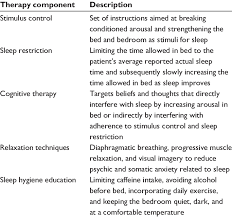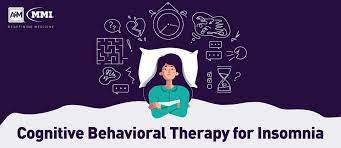The Power of CBT-I for Better Sleep
Sleep is essential for our overall well-being, yet many individuals struggle with insomnia and other sleep disorders. Cognitive Behavioral Therapy for Insomnia (CBT-I) is a highly effective treatment that can help improve sleep quality and quantity without the use of medication.
CBT-I focuses on changing behaviors and thoughts that negatively impact sleep. It addresses the underlying causes of insomnia and helps individuals develop healthy sleep habits. This therapy combines cognitive therapy, which targets negative thought patterns about sleep, with behavioral therapy, which aims to improve sleep hygiene and promote relaxation.
One key aspect of CBT-I is stimulus control, which involves associating the bed and bedroom with sleep rather than wakefulness. This technique helps retrain the brain to recognize the bed as a place for restful sleep. Another component is sleep restriction, which limits the time spent in bed to match actual sleep duration, thereby increasing sleep efficiency.
CBT-I also includes relaxation techniques to reduce anxiety and promote relaxation before bedtime. By incorporating mindfulness practices, deep breathing exercises, or progressive muscle relaxation, individuals can calm their minds and bodies to facilitate falling asleep more easily.
Research has shown that CBT-I is as effective as medication in treating chronic insomnia and can lead to long-lasting improvements in sleep quality. Unlike medications that may have side effects or dependency issues, CBT-I offers a natural and sustainable solution for better sleep.
If you struggle with insomnia or poor sleep quality, consider exploring Cognitive Behavioral Therapy for Insomnia (CBT-I) as a holistic approach to improving your sleep patterns and overall well-being.
7 Effective CBTI Tips for Better Sleep: Establishing Routines and Creating a Sleep-Friendly Environment
- Establish a consistent sleep schedule by going to bed and waking up at the same time every day.
- Create a relaxing bedtime routine to signal to your body that it’s time to wind down and prepare for sleep.
- Make your bedroom conducive to sleep by keeping it dark, quiet, and at a comfortable temperature.
- Avoid caffeine, nicotine, and alcohol close to bedtime as they can disrupt your sleep patterns.
- Limit exposure to screens (phones, computers, TVs) before bed as the blue light can interfere with melatonin production.
- Engage in regular physical activity during the day but avoid vigorous exercise close to bedtime.
- Consider seeking help from a healthcare professional if you continue to experience persistent sleep difficulties despite trying CBTI techniques.
Establish a consistent sleep schedule by going to bed and waking up at the same time every day.
Establishing a consistent sleep schedule is a key tip in Cognitive Behavioral Therapy for Insomnia (CBT-I). By going to bed and waking up at the same time every day, you help regulate your body’s internal clock, known as the circadian rhythm. This consistency reinforces your body’s natural sleep-wake cycle, making it easier to fall asleep and wake up feeling refreshed. By maintaining a regular sleep schedule, you can improve the quality and duration of your sleep, ultimately promoting better overall health and well-being.
Create a relaxing bedtime routine to signal to your body that it’s time to wind down and prepare for sleep.
Creating a relaxing bedtime routine is a crucial tip in Cognitive Behavioral Therapy for Insomnia (CBT-I) to help signal to your body that it’s time to wind down and prepare for sleep. By establishing consistent pre-sleep rituals such as reading a book, taking a warm bath, or practicing gentle yoga stretches, you can condition your mind and body to relax and transition into a restful state conducive to falling asleep easily. These calming activities can help reduce stress and anxiety levels, setting the stage for a peaceful night’s sleep.
Make your bedroom conducive to sleep by keeping it dark, quiet, and at a comfortable temperature.
Creating a sleep-conducive environment in your bedroom is essential for improving your sleep quality. To enhance your restful slumber, ensure that your bedroom is dark, quiet, and maintained at a comfortable temperature. Blocking out light and noise can help signal to your body that it’s time to rest, while keeping the room cool can promote relaxation and prevent disturbances that may disrupt your sleep. By optimizing these environmental factors, you can create an ideal setting for a peaceful night’s sleep and support the effectiveness of Cognitive Behavioral Therapy for Insomnia (CBT-I) in addressing sleep issues.
Avoid caffeine, nicotine, and alcohol close to bedtime as they can disrupt your sleep patterns.
It is advisable to avoid consuming caffeine, nicotine, and alcohol close to bedtime as they can disrupt your sleep patterns. Caffeine, a stimulant found in coffee, tea, and some sodas, can interfere with falling asleep and reduce sleep quality. Nicotine, commonly found in tobacco products, is also a stimulant that can make it harder to fall asleep and stay asleep. Alcohol may initially make you feel drowsy but can disrupt the later stages of sleep, leading to fragmented rest. By steering clear of these substances before bedtime, you can promote better sleep hygiene and enhance your chances of enjoying a restful night’s sleep.
Limit exposure to screens (phones, computers, TVs) before bed as the blue light can interfere with melatonin production.
Limiting exposure to screens such as phones, computers, and TVs before bed is a crucial tip in Cognitive Behavioral Therapy for Insomnia (CBT-I) sleep practices. The blue light emitted from screens can disrupt the production of melatonin, a hormone that regulates our sleep-wake cycle. By reducing screen time before bedtime, individuals can help their bodies naturally adjust to the evening hours and promote better sleep quality. Incorporating this simple habit into a bedtime routine can have a significant impact on improving overall sleep patterns and enhancing restful sleep.
Engage in regular physical activity during the day but avoid vigorous exercise close to bedtime.
To enhance the effectiveness of Cognitive Behavioral Therapy for Insomnia (CBT-I) and improve your sleep quality, it is advisable to engage in regular physical activity during the day. However, it is important to avoid vigorous exercise close to bedtime. Regular physical activity can help regulate your sleep-wake cycle and promote better overall sleep patterns. By incorporating exercise into your daily routine earlier in the day, you can reap the benefits of improved sleep without disrupting your ability to fall asleep at night.
Consider seeking help from a healthcare professional if you continue to experience persistent sleep difficulties despite trying CBTI techniques.
If you continue to experience persistent sleep difficulties despite implementing Cognitive Behavioral Therapy for Insomnia (CBT-I) techniques, it may be beneficial to seek help from a healthcare professional. A qualified professional can provide further assessment, guidance, and personalized strategies to address your specific sleep challenges. Don’t hesitate to reach out for additional support to improve your sleep quality and overall well-being.



